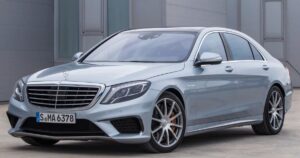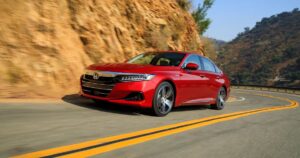Hybrid cars are popular for their ability to combine fuel efficiency with environmental friendliness. These vehicles use both gasoline and electricity to power the engine. However, not all fuels work the same in a hybrid car.
The type of fuel you choose can affect the car’s performance, efficiency, and emissions. In this article, we will explore what type of fuel is best for hybrid cars, why it’s important, and how different fuels can impact your hybrid’s overall performance.
What Is The Best Fuel For A Hybrid Car?
The best fuel for a hybrid car depends on its engine design. Most hybrid cars use regular unleaded gasoline. However, some manufacturers recommend premium gasoline for better performance. The key is to follow the manufacturer’s guidelines.
- Regular gasoline: Suitable for most hybrid engines.
- Premium gasoline: May be recommended for high-performance hybrids.
- E85 ethanol: Some hybrids can run on ethanol-blended fuels, but it’s not ideal for all models.
Choosing the right fuel helps maintain engine efficiency and longevity.
Why Regular Gasoline Works Best
Most hybrid cars are designed to run on regular gasoline. This fuel type is affordable and readily available. Using regular gasoline ensures that the engine operates smoothly without causing any damage.
- The engine is optimized for regular gasoline.
- It offers a balance between performance and cost.
- It is widely available, making refueling convenient.
Premium gasoline, while available, may not offer significant benefits unless the manufacturer specifically recommends it.
Does Premium Gasoline Improve Hybrid Car Performance?

Many drivers wonder if using premium gasoline will improve their hybrid car’s performance. Premium gasoline has a higher octane level, which can help high-performance engines. However, for most hybrids, using premium fuel is unnecessary unless specified by the manufacturer.
- Premium gasoline offers more power in high-compression engines.
- Most hybrids do not require premium fuel for regular use.
- Using premium fuel in a regular hybrid engine may not justify the higher cost.
It is best to stick with regular gasoline unless you own a high-performance hybrid model that benefits from premium fuel.
Ethanol Blended Fuels Are Safe For Hybrids?
Ethanol-blended fuels, such as E85, are made from a mixture of ethanol and gasoline. Some hybrids are capable of running on these blends. However, not all hybrid models are compatible with ethanol-blended fuels.
- Ethanol is renewable and reduces emissions.
- Not all hybrids can handle the high ethanol content in E85.
- Using the wrong ethanol blend can harm the engine over time.
If your hybrid is compatible with ethanol-blended fuels, it can be an eco-friendly option, but check your car’s manual before using it.
CNG (Compressed Natural Gas) As A Fuel Option
Compressed Natural Gas (CNG) is another alternative fuel option for hybrid cars, although it is not widely used. CNG is a cleaner fuel compared to gasoline or diesel, producing fewer emissions. It is also cheaper than gasoline.
The downside to CNG is the limited availability of refueling stations, especially in certain regions. Additionally, hybrid cars that use CNG require specialized engines, limiting the variety of vehicles available.
- Pros: Lower emissions and cheaper fuel costs.
- Cons: Limited availability of refueling stations and specialized engine requirements.
What Role Does Diesel Play in Hybrid Cars?
Diesel engines are known for their efficiency, but they are not commonly used in hybrid cars. Diesel hybrids exist but are not as popular as gasoline-electric hybrids. Diesel is more energy-dense than gasoline, which means it offers better fuel economy in some cases.
- Diesel is less common in hybrids but offers higher fuel efficiency.
- Diesel engines produce more torque, which can be beneficial for heavy vehicles.
- Diesel fuel is more expensive and has a higher environmental impact.
If you are considering a diesel hybrid, weigh the benefits of better fuel economy against the higher cost of diesel fuel and potential environmental concerns.
Alternative Fuels Can Power A Hybrid Car?
As technology evolves, alternative fuels like hydrogen and biodiesel are being explored for use in hybrid vehicles. While these fuels are not yet widely available for hybrid cars, they hold promise for the future.
- Hydrogen fuel cells offer clean energy with zero emissions.
- Biodiesel is renewable and can reduce carbon emissions.
- Both options are in the early stages of adoption for hybrid technology.
While not commonly used in today’s hybrids, alternative fuels could become more viable as the industry advances.
How Fuel Affects Hybrid Engine Longevity

Using the right fuel is critical for the longevity of your hybrid car’s engine. Regular maintenance and choosing the recommended fuel type ensure that your engine operates smoothly for years to come.
- Regular gasoline provides optimal performance in most hybrids.
- Premium gasoline may cause unnecessary wear if not required.
- Ethanol-blended fuels can damage engines not designed for them.
Following the manufacturer’s fuel recommendations will help prevent costly repairs and maintain engine health.
Fuel Efficiency And Environmental Impact
One of the main reasons drivers choose hybrid cars is for their fuel efficiency. The electric motor reduces the amount of gasoline used, lowering the overall environmental impact. However, the type of gasoline used also affects the car’s emissions and fuel efficiency.
- Regular gasoline is sufficient for most hybrid cars.
- Ethanol-blended fuels reduce emissions but may affect performance.
- Diesel hybrids offer better fuel efficiency but with a higher environmental cost.
Choosing the right fuel not only improves your car’s performance but also reduces your carbon footprint.
The Cost Of Fuel For Hybrid Cars
Fuel costs can vary depending on the type of gasoline you use. Regular gasoline is more affordable than premium gasoline, but premium may offer benefits for high-performance hybrids. Diesel and ethanol-blended fuels also come with different price points.
- Regular gasoline is the most cost-effective option for most hybrids.
- Premium gasoline costs more but offers minimal benefits for standard hybrids.
- Ethanol and diesel fuels can be more expensive depending on your location.
Consider the overall fuel costs when choosing the best option for your hybrid car.
The Impact Of Driving Habits on Fuel Choice
Your driving habits can influence the type of fuel that works best for your hybrid car. City driving with frequent stops and starts relies more on the electric motor, while highway driving uses more gasoline.
- City driving reduces the need for high-performance fuels.
- Highway driving may benefit from premium gasoline in some hybrids.
- Fuel efficiency is maximized when the electric motor is used effectively.
Consider your driving patterns when deciding whether to invest in premium gasoline or stick with regular fuel.
Hybrid Car Maintenance And Fuel Choice
Regular maintenance is essential for keeping your hybrid car running smoothly. Using the right fuel type can help reduce wear and tear on the engine, improving the car’s longevity.
- Follow the manufacturer’s fuel recommendations for best results.
- Regular gasoline is sufficient for most hybrids.
- Using premium or alternative fuels when not needed can increase maintenance costs.
Maintaining your hybrid car with the proper fuel helps avoid unnecessary repairs and prolongs its life.
Comparing Fuel Options For Hybrids
There are several fuel options available for hybrid cars, each with its pros and cons. Regular gasoline is the most common choice, but some drivers may consider premium gasoline, ethanol-blended fuels, or even diesel in certain hybrid models.
- Regular gasoline: Affordable and suitable for most hybrids.
- Premium gasoline: Beneficial for high-performance hybrids.
- Ethanol-blended fuels: Eco-friendly but not ideal for all models.
- Diesel: Higher fuel economy but less common in hybrids.
Weigh the benefits and drawbacks of each fuel type when deciding what’s best for your hybrid car.
Is Regular Gasoline The Best Option For Hybrids?

For most hybrid car owners, regular gasoline is the best option. It is affordable, readily available, and works efficiently with the engine design. Premium gasoline or ethanol blends may offer specific benefits, but they are not necessary for every hybrid car.
- The majority of hybrids are designed for regular gasoline.
- Premium fuels offer minimal benefits for most hybrids.
- Ethanol blends can work in some hybrids but are not widely used.
Stick with regular gasoline unless your car’s manufacturer recommends an alternative.
Frequently Asked Questions
1. Can I use premium gasoline in my hybrid car?
Yes, but it is not necessary unless your hybrid car’s manufacturer recommends it. Most hybrid cars are designed to run on regular gasoline.
2. Is ethanol-blended fuel safe for hybrid cars?
Some hybrid cars can run on ethanol-blended fuels, but not all are compatible. Check your car’s manual to see if it supports ethanol blends like E85.
3. Do hybrid cars require diesel fuel?
Diesel is not commonly used in hybrid cars. There are diesel-hybrid models, but gasoline-electric hybrids are more popular.
4. Will using the wrong fuel damage my hybrid engine?
Yes, using the wrong fuel can cause engine damage. Always follow the manufacturer’s fuel recommendations to avoid costly repairs.
Conclusion
Choosing the right fuel for your hybrid car is essential for maintaining performance, efficiency, and engine health. Regular gasoline is the best option for most hybrid cars, providing a balance between cost and performance.
Premium gasoline may offer benefits for high-performance hybrids while ethanol blended fuels and diesel are less common choices. By following the manufacturer’s guides and considering your driving habits you can make the best fuel choice for your hybrid car.

Hello, Ride here I’m excited to share everything about hybrid cars. We provide helpful Tips And guide about hybrid cars.











